Key Notes
-
Hello from DC
Drea and I are in Washington, DC exhibiting at the ASAE TEC 2019 trade show, meeting Association KLASusers and potential users. We'll be back with a regular blog post next week!
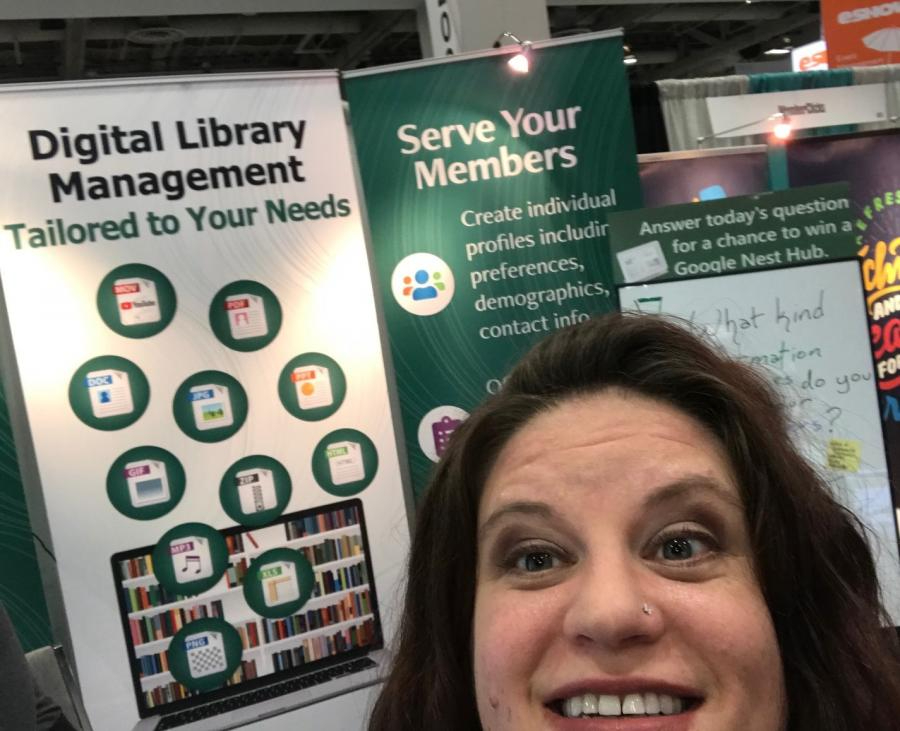
Join us next Tuesday for our regularly scheduled Key Notes blog posts.
-
1/11/2024 KLAS LBPD Users' Roundtable: Volunteers
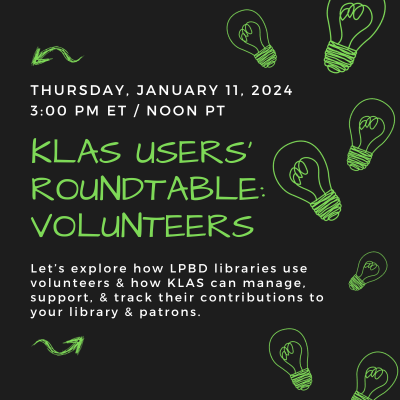
Volunteers makeup an important part of the Library for the Blind & Print Disabled (LBPD) / Talking Book Library community and contribute greatly to their success. Each library utilizes volunteers uniquely; from shelving and circulation to readers advisory to recording content. Join the KLAS program committee for a presentation from a few of our outstanding network libraries discussing how they train and deploy their volunteers, and how they use KLAS to support and manage them.
This free, online session was held via Zoom on January 11th at 3 PM Eastern / Noon Pacific.
Recording
Downloads
-
12/14/2021 APH Integration Update Webinar
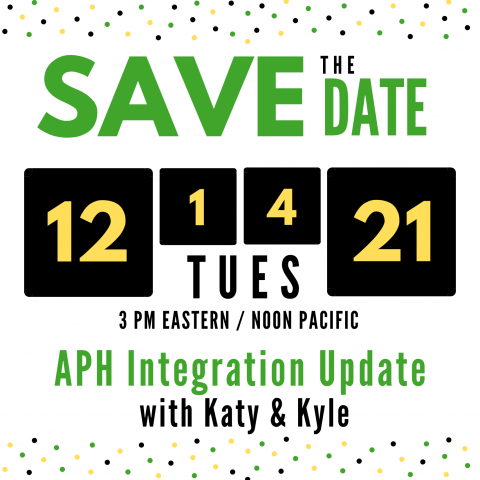
On Tuesday, December 14, 2021 at 3 PM Eastern / Noon Pacific Katy and Kyle will be offering a live webinar focused on sharing information and details about the integration between KLAS and APH's ordering system and catalog of products. During this session, we plan to demonstrate KLAS screens, discuss planned workflows, share development updates, take suggestions, and answer questions. We invite any and all Instructional Resource / Instructional Materials Center users to mark your calendar now and join us for this special Keystone webinar!
- Date: Tuesday, December 14, 2021
- Time: 3:00 PM Eastern Standard Time / Noon Pacific Standard Time
- Zoom Meeting Link: https://us02web.zoom.us/j/87018666883?pwd=WUZhSW5YVTBwRmxlVnRIQlpwZHhjUT09
If you have any questions or comments you wish to submit in advance, you can send them to:
In the meantime, we invite you to review the recordings of the APH 2021 KLAS IRC / IMC Users' Meeting from 10/12/2021 and the recent KLAS IRC / IMC Users' Roundtable held on 11/3/2021 during which we discussed the current status of the KLAS / APH Integration Project.
Full Connection info:
Join Zoom Meeting: https://us02web.zoom.us/j/87018666883?pwd=WUZhSW5YVTBwRmxlVnRIQlpwZHhjUT09
Meeting ID: 870 1866 6883
Passcode: 632597
One tap mobile
+19292056099,,87018666883#,,,,*632597# US (New York)
+13017158592,,87018666883#,,,,*632597# US (Washington DC)
Dial by your location
+1 929 205 6099 US (New York)
+1 301 715 8592 US (Washington DC)
+1 312 626 6799 US (Chicago)
+1 669 900 6833 US (San Jose)
+1 253 215 8782 US (Tacoma)
+1 346 248 7799 US (Houston)
Meeting ID: 870 1866 6883
Passcode: 632597
Find your local number: https://us02web.zoom.us/u/kda33PJihT -
2019 ASGCLA Awards Breakfast
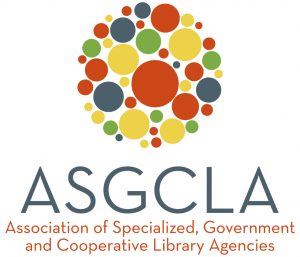
At 8:30 AM on Saturday, June 22 the Association of Specialized Government and Cooperative Libraries held their annual Achievement Awards Breakfast at the Grand Hyatt Washington as part of the American Library Association Annual Conference. Keystone is a proud sponsor of the breakfast and the ASGCLA / KLAS / NOD (National Organization on Disability) Award. This year two members of the KLAS Users' Community were honored at the breakfast, and I was excited to be there to see them recognized for their hard work to promote accessible libraries and inclusive library services.
Kim Charlson, Executive Director, Perkins Library, received the 2019 Francis Joseph Campbell Award citation and medal for "her strong commitment to inclusion and empowerment, her tireless efforts on the passage of the Marrakesh Treaty for the Visually Impaired, and her life-long passion for bringing the joy of reading to all."
- ASGCLA 2019 Francis Joseph Campbell Award Press Release
South Carolina State Library Talking Book Services received the 2019 ASGCLA / KLAS / NOD Award for its Assistive Technology Petting Zoo. "The Zoo was developed as a new outreach initiative in 2015 to raise awareness for Assistive Technology and its ability to make public libraries more accessible and inclusive.... One of the most significant contributions the Zoo has made has been allowing South Carolina’s public librarians hands-on experience with Assistive Technology, creating a desire for the library to offer these tools on a daily basis."
- 2019 ASGCLA / KLAS / NOD Award Press Release
Below are a few photos I took during Saturday morning's Award Breakfast. You can see all of them in an album on Keystone's Facebook Page.
Kim Charlson poses for photos with 2 ASGCLA representatives after being recognized as the 2019 Francis Joseph Campbell Award Winner.
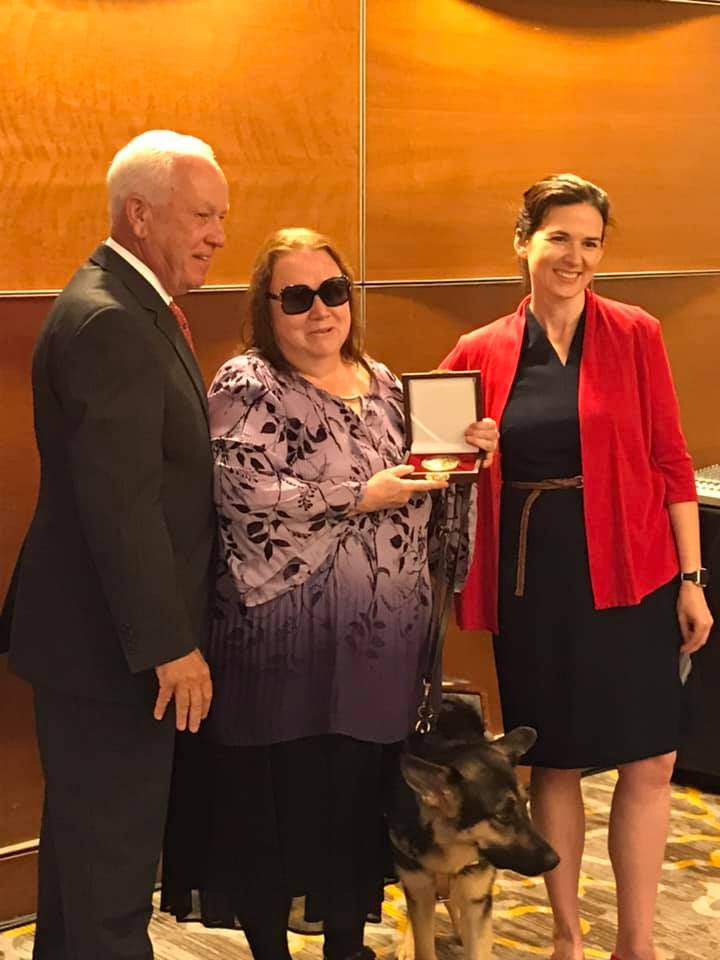
Kim shows off the citation she received as the 2019 Francis Joseph Campbell Award Recipient.
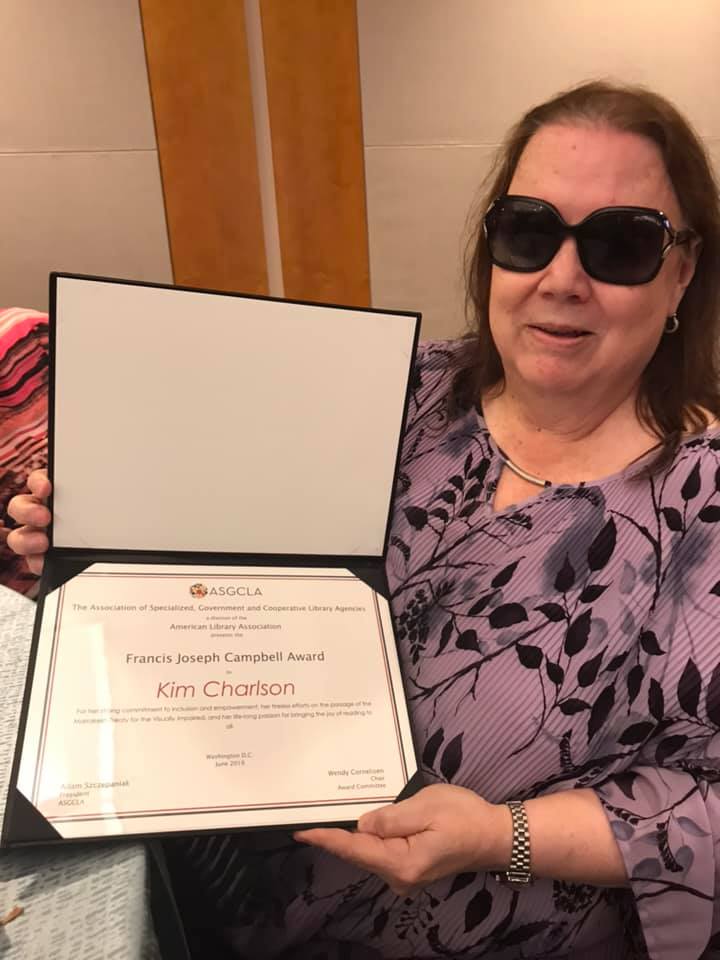
Members of the South Carolina State Library staff gather around a table before the ASGCLA Awards Breakfast begins.
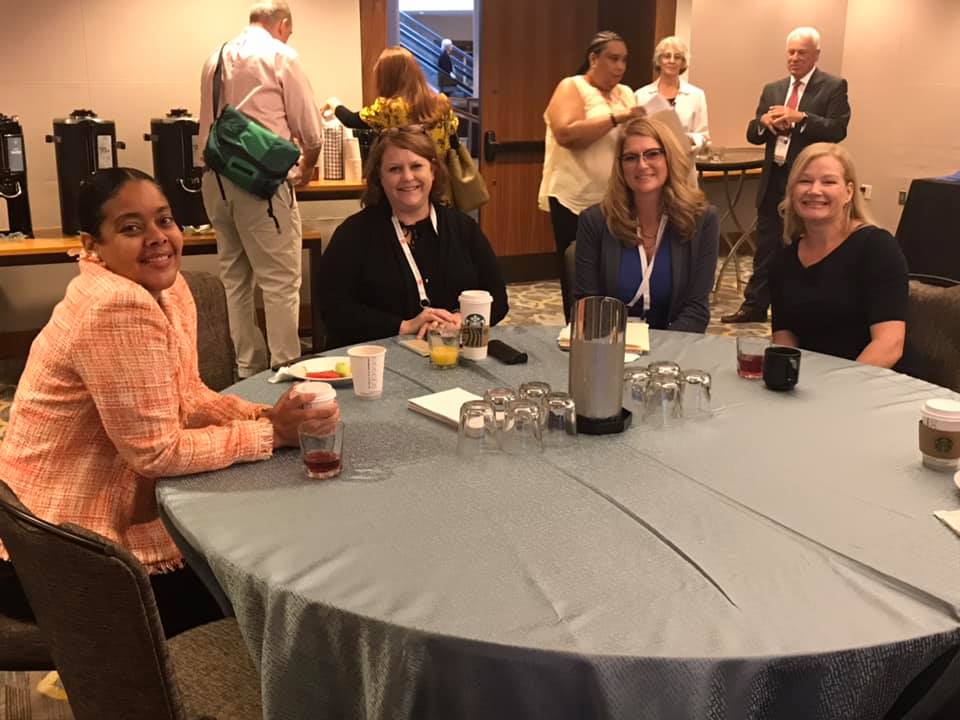
ASGCLA representatives and South Carolina State Library staff pose with me for a photo after being presented with the 2019 ASGCLA / KLAS / NOD Award.
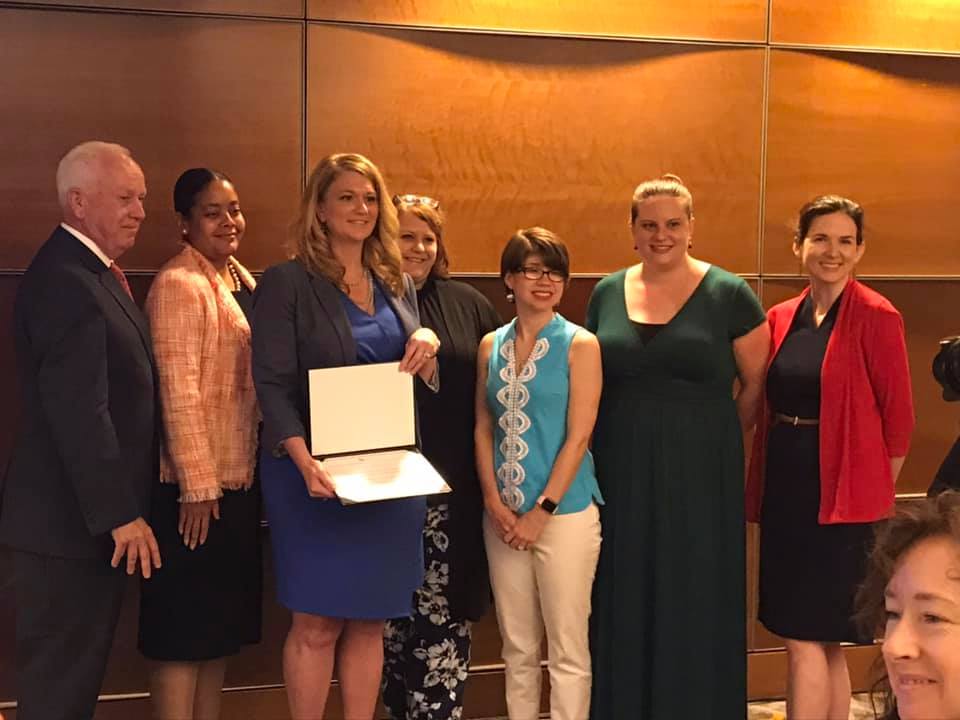
The certificate presented to the South Carolina State Library Talking Books Services as part of the 2019 ASGCLA / KLAS / NOD Award. They also receive $1000 from Keystone Systems as part of their recognition.
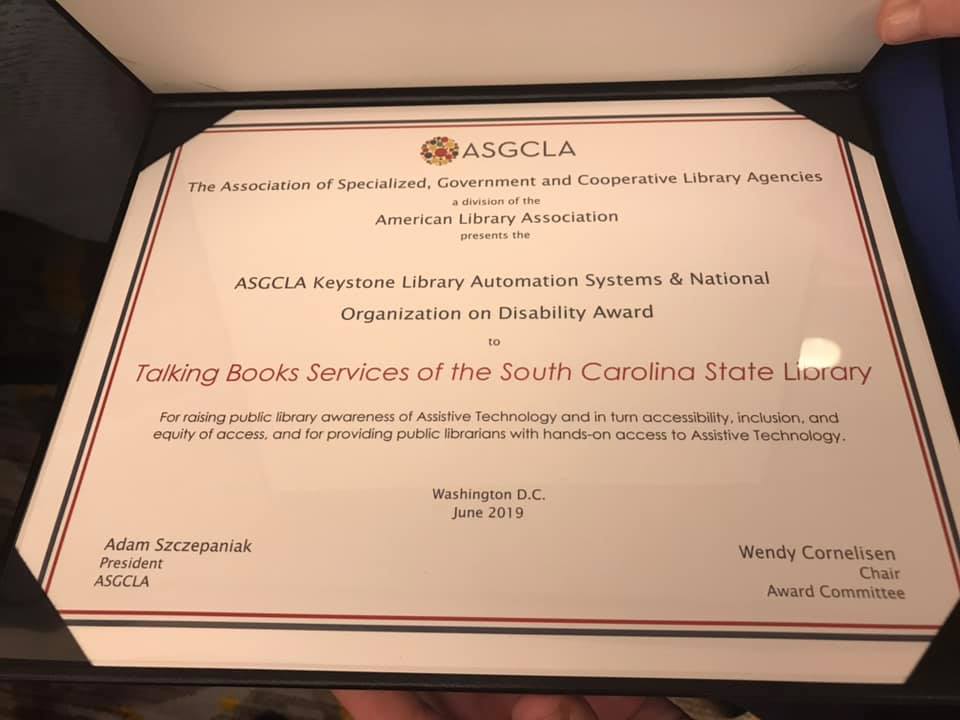
You can see the rest of the photos I took in the 2019 ASGCLA Awards Breakfast album on Keystone's Facebook page.
-
2019 Holiday Potluck & Gift Exchange
Every year, Keystone's staff get together for a bit of fun one Friday during December. Everyone contributes a dish to our potluck lunch and brings a gift for our White Elephant gift exchange. For this week's blog post, I thought y'all might enjoy a look at some of last Friday's festivities.
We had a wonderful spread of food including all the holiday favorites like sweet potato casserole, green bean casserole, cranberry sauce, and more!
This year's potluck included a battle of the soups between John O's Sausage Toretellini soup and my Chicken Taco soup, but in the end, both were declared a winner!
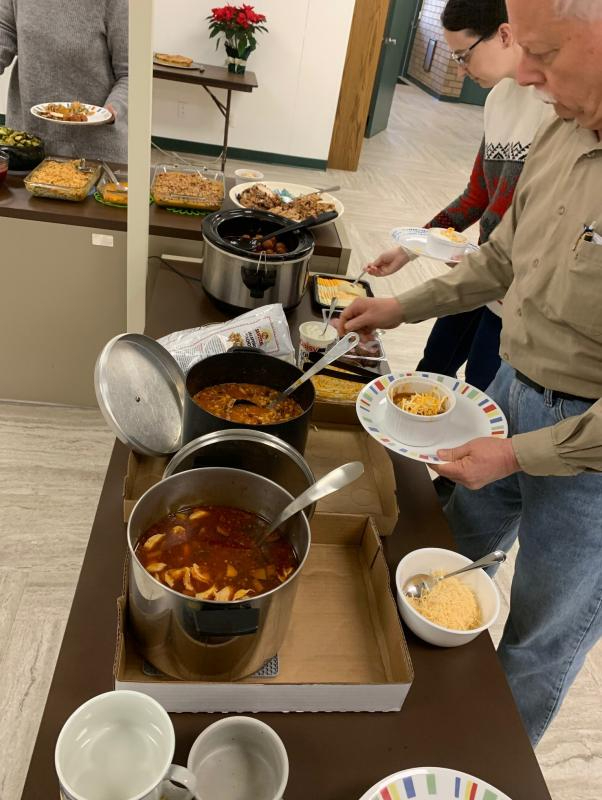
This year James and Colin contributed what might have been "THE BIGGEST APPLE PIE EVER" (TM). In addition to being enormous, it was also super tasty!
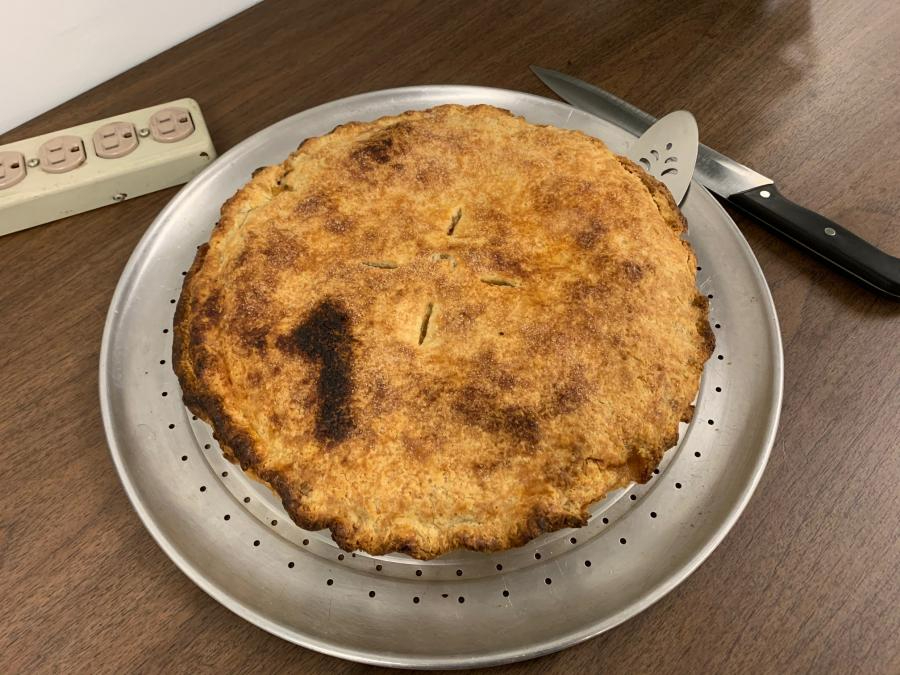
It's always fun to try to figure out who brought what present. Be careful, heavy doesn't always mean good. ;)
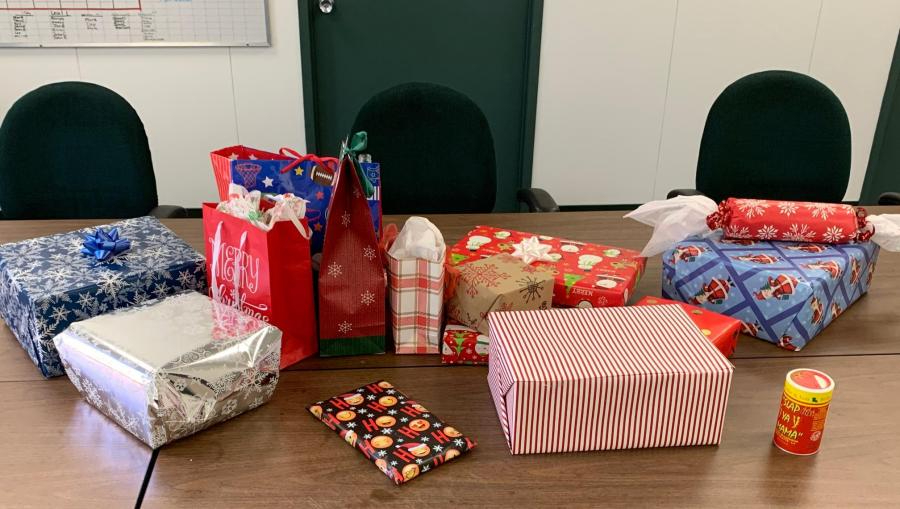
Happy Holidays from the Keystone staff! One of the greatest joys of this season is getting to say THANK YOU for the opportunity to serve you and to wish you the very best for the New Year!
-
2019 Year in Review
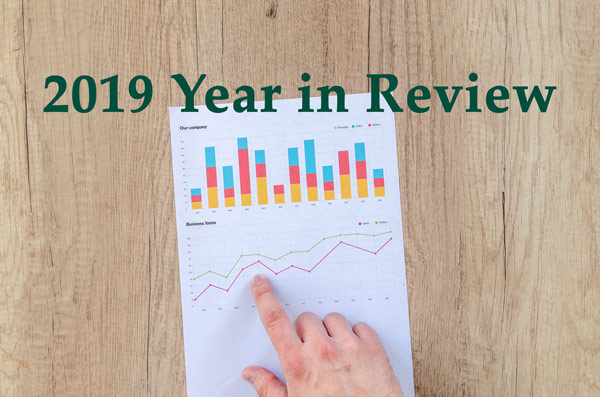
I don’t know about you, but when I stop and look back at how far we’ve come since January, how my goals and focus have shifted to keep up with your needs and all of our new developments...it’s been a long year!
KLAS Version 7.7
The new version of KLAS is a major update, with some big changes on the back-end, high-volume Duplication on Demand support, and a rapid “Agile” development cycle.
The Beta deployment of 7.7 to North Carolina Library for the Blind and Physically Handicapped at the beginning of the year allowed us to track down and fix a ton of issues -- all while getting Gutenberg integration in place and developing the new deployment processes. We were finally able to start bringing more libraries on board in May, and are now working on bringing our IRC/IMCs up on the new system as well.
All but three Keystone-Hosted libraries now have at least a 7.7 Preview database, we’re making steady progress on self-hosted libraries, and we’ve begun work on the Perkins National Deaf-Blind Equipment Distribution Program (PNDB)’s database as well as our first 7.7 IRCs!
It has been a long road, but we’re now well on our way to a full conversion to 7.7. Development for the new version has been rolling along beautifully all the way up to our current version, 7.7.20.
New Features
There have been too many New Features over the past year to name, but here are some highlights:
- The new installation and upgrade processes reduce or eliminate the need for admin access, IT assistance, and multiple downloads.
- KLAS can now handle the extended UTF8 character set, including more diacritics.
- HTTPS encryption replaces VPNs to keep your data secure while allowing a more streamlined installation.
- eCommerce Integration is now available.
- The Merge Query Function has been added to the Patron and Catalog modules, allowing you to do more with queries than ever.
- The ability to Query on Patron Subscription information is now available in Patron.
- The Apply / Remove Headings to Query Set tool allows you to update Subjects or other Headings on a batch of Titles all at once.
- The Batch Update Patron Medium tool allows you to apply Profile changes to a batch of Patrons.
- You can now print eDocs from the Shipping Wizard.
And that doesn’t include the numerous new features implemented to support Duplication on Demand!
Duplication on Demand
As those who’ve used or are still using the original PCC workflow know: it’s a very hands-on process and unfortunately prone to errors.
The new Duplication workflows, which leverage a dedicated appliance such as a Scribe or Gutenberg, were designed to shift as much of the work as possible from library staff and external programs back to KLAS itself. A complete conversion to Duplication on Demand, rather than just using DoD or PCC as a supplement to traditional circulation, is a huge paradigm shift which necessitated some trial-and-error -- and a whole lot of development.
We found it necessary strike a balance between updating and re-using old processes (like mail card batches and the nightly programs now used to refill Service Queues), completely new programming, and everything in-between.
We are very pleased that we now have four libraries actively using Scribe (with a fifth being brought online this month) and two live on Gutenberg!
The duplication workflows continue to be refined as we receive feedback from our pioneering libraries including the new KLAS screens (such as the Service Queue and Duplication Order tabs), the duplication appliances, and all of the communications in-between that make it all work.
KLAS Users’ Conference 2019 and More!
In early June, the Palm Beach County Talking Books Service and the Friends of the Palm Beach County Library hosted the 2019 KLAS Users' Conference in West Palm Beach, FL. It was a great opportunity to work with some of you in person during a hands-on pre-conference, a variety of Keystone- and user-led sessions, and even a duplication Petting Zoo where we demonstrated the workflows of both the Scribe and Gutenberg.
However, as we head into the off-year between conferences that doesn’t mean there aren’t any opportunities to learn more about KLAS or network with your fellow users. We introduced a variety of other opportunities this year -- from Q&A Webinars to an IRC Symposium. Thanks to all your positive feedback, we’ll be offering even more things like this next year as well!
KLASusers.com Content
Finally, we’ve made a significant effort in the last year to be more proactive in communicating what’s happening at Keystone and with KLAS. We hope you’ve found it beneficial even when we’re racking our brains trying to come up with yet another blog post topic or forum tip. So, if there’s something you’d like to have us cover in a webinar, a blog post, or a discussion forum tip please let us know.
In sum, it has been an amazing (and busy, and sometimes difficult, and ultimately rewarding) year, and I am looking forward to discovering what 2020 will bring.
-
2020 Disaster Preparedness & Recovery Updates
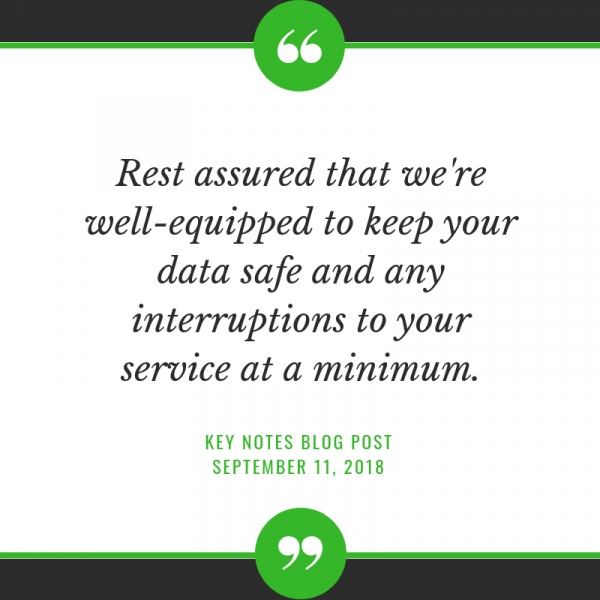
Here in North Carolina we usually think of late summer / early fall as the start of hurricane season. Well, this year is different (as is everything else in 2020) and we've already had a couple of named hurricanes develop, with one hitting Outer Banks in late July. Therefore, we wanted to go ahead and review what we do ensure we can continue to serve your library, your staff, and your patrons after a natural disaster, and share the additional improvements we've made this year to our Disaster Preparedness and Recovery plans. We've spent a significant amount of time building infrastructure, reviewing procedures, and planning for an untimely incident.
In fact, much of what we put into place as part of our disaster preparedness plan is what allowed our staff to begin to work from home in March and continue to do so even today and for the foreseeable future.
Our September 11, 2018 Key Notes Blog Post was written as we faced the threat of Hurricane Florence and shared details about we'd implemented at that point including a combination of both procedural and physical preparedness such as:
- A gas-powered generator at our office
- Redundant internet providers, firewalls, and network routers
- Daily backups of data to our on-site servers
- Weekly data backups stored offsite
- Encrypted database backups on AWS S3
- VOIP Telephone system to allow staff to work remotely
- Keystone Status Page to communicate database availability, even if we’re unreachable
- Contingency plans and equipment needed for remote database and customer support
On August 15, 2019, Katy posted to share the news of some additional steps we'd taken to further enhance our disaster preparedness and recovery efforts including:- Back-end changes to KLAS 7.7 to it quicker and easier to create and store database back-ups
- A move to storing back-ups in the cloud, so they are safe and retrievable no matter where disaster strikes
A new monitoring app so staff can be notified right away if something goes wrong with the servers and any emergencies can be dealt with as quickly as possible
Today I'd like to share this year's improvements to our disaster recovery and preparedness process and infrastructure, which include:- Cloud-based databases running in multiple regions, to better place the system geographically near the library
- Incremental transaction data backups happen every 10 minutes
- Database backups are saved in the local region, as well as to a separate region. If a database hosted on the east coast has a disaster, there is a copy of the database backup in another region.
- Database backups are saved to the local server, as well as copied to S3 storage
- Database backups are also copied from Amazon's data centers to Google Storage
- A new automated system restoration process which had been manual prior to the beginning of 2020. As an automated process, it takes about an hour while the previous manual process took 10-12 hours at a minimum.
-
2021 Disaster Preparedness & Recovery Update

Since 2018, we've made an annual post detailing our infrastructure and planning efforts to serve your library, your staff, and your patrons after a natural disaster, and share the additional improvements we've made in the last year to our Disaster Preparedness and Recovery plans. We've spent a significant amount of time building infrastructure, reviewing procedures, and planning for an untimely incident. For this year's post, we starting with our most recent upgrades and working backwards to our original September 2018 update.

2021 Updates & Improvements
To prepare for this year's post, we asked Lee what he felt were important updates or changes made in 2021, or for any other info he wants the KLAS Users' Community to know about our efforts. The two items he mentioned are:
- The recovery process is the the same as before, but note that restoration of databases is sequential (per server), not parallel. So, while a one-hour recovery for a database at top of the queue is possible others at the bottom of the list will have a longer wait as the recovery process works through the list.
- We have added weekly server snapshots to our AWS backup servers. For an end user, this makes no difference to restoration, but it makes Keystone staff's jobs infinitely easier.
2020 Updates & Improvements
Much of what we put into place as part of our disaster preparedness plan in 2020 is what allowed our staff to begin to work from home in March of that year and continue to do so even today and for the foreseeable future.
On September 1, 2020 posted a list disaster recovery and preparedness process and infrastructure improvements we'd make over the past year such as:
- Cloud-based databases running in multiple regions, to better place the system geographically near the library
- Incremental transaction data backups happen every 10 minutes
- Database backups are saved in the local region, as well as to a separate region. If a database hosted on the east coast has a disaster, there is a copy of the database backup in another region.
- Database backups are saved to the local server, as well as copied to S3 storage
- Database backups are also copied from Amazon's data centers to Google Storage
- A new automated system restoration process which had been manual prior to the beginning of 2020. As an automated process, it takes about an hour while the previous manual process took 10-12 hours at a minimum.
2019 Updates & Improvements
On August 15, 2019, we shared the news of some additional steps we'd taken to further enhance our disaster preparedness and recovery efforts including:
- Back-end changes to KLAS 7.7 to it quicker and easier to create and store database back-ups
- A move to storing back-ups in the cloud, so they are safe and retrievable no matter where disaster strikes
- A new monitoring app so staff can be notified right away if something goes wrong with the servers and any emergencies can be dealt with as quickly as possible
2018 Updates & Improvements
Our September 11, 2018 our first Emergency Recovery & Disaster Preparedness Key Notes Blog post was written as we faced the threat of Hurricane Florence and shared details about we'd implemented at that point including a combination of both procedural and physical preparedness such as:
- A gas-powered generator at our office
- Redundant internet providers, firewalls, and network routers
- Daily backups of data to our on-site servers
- Weekly data backups stored offsite
- Encrypted database backups on AWS S3
- VOIP Telephone system to allow staff to work remotely
- Keystone Status Page to communicate database availability, even if we’re unreachable
- Contingency plans and equipment needed for remote database and customer support
-
2021 in James' Rearview
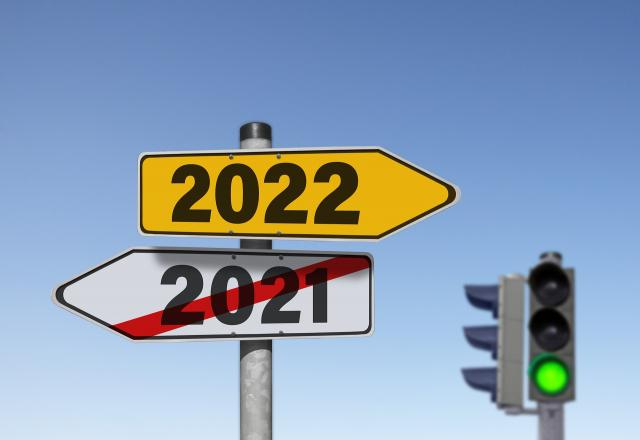 From the desk of James Burts, CEO, Keystone Systems:As we enter the new year, it’s time to both look back at 2021 and ahead to things to come in 2022. 2021 was a year with ups and downs. While it wasn’t our first year to cope with the complexities of Covid, we certainly hoped 2021 would bring Covid to a close. That certainly didn’t happen, and we continue to work remotely and miss out on the simple pleasures of getting to see our coworkers and stay in touch about the details of one another’s lives. (“How was your son’s baseball game last night?” “Did your daughter get the part she wanted in the school play?” “Hey, what nice restaurant do you recommend for our anniversary dinner next week?“) We are making it work to work remotely, but also acutely aware what we’re missing.On the other hand, 2021 was the year that we had (by far) the largest participation in a KLAS Users' Conference. This was largely because the conference was forced to become an on-line, virtual conference. It allowed nearly twice the usual number of participants to attend, because people could attend without having to travel. We all learned a lot from that conference--both in terms of the content that was shared, and in how to best utilize an online platform to put on the conference.2021 was also the year had to say goodbye to Kay Holloman, the co-founder and longtime CEO of Keystone Systems. Though she retired from the daily goings-on of Keystone over 10 years ago, she was still a valued advisor and staunch advocate for our libraries until the very end. Mitake and I will do our very best to continue her passion for excellent customer care by making sure libraries always get the service and support they need from us in order to succeed and thrive.Finally, in 2021, we welcomed the West Virginia Instructional Resource Center (WV IRC) to the Keystone family. They chose KLAS to provide the capabilities they need to take their services to the students of West Virginia to a new level while allowing their staff to work far more efficiently. It is truly a win-win for everyone involved. Welcome WV IRC!!As we look ahead to 2022, we hope for the day we can *finally* get back to the office, at least to some degree. I don’t know that we’ll ever return to 100% in person at the; we’ve all become accustomed to working from home, and there are some real benefits to being to doing so. For our IRC customers, we will continue development of the new integration of KLAS with APH’s ordering system. As for our LBPDs, we’re developing new partnerships with NLS to improve integrations and hopefully to streamline Serials processing.
From the desk of James Burts, CEO, Keystone Systems:As we enter the new year, it’s time to both look back at 2021 and ahead to things to come in 2022. 2021 was a year with ups and downs. While it wasn’t our first year to cope with the complexities of Covid, we certainly hoped 2021 would bring Covid to a close. That certainly didn’t happen, and we continue to work remotely and miss out on the simple pleasures of getting to see our coworkers and stay in touch about the details of one another’s lives. (“How was your son’s baseball game last night?” “Did your daughter get the part she wanted in the school play?” “Hey, what nice restaurant do you recommend for our anniversary dinner next week?“) We are making it work to work remotely, but also acutely aware what we’re missing.On the other hand, 2021 was the year that we had (by far) the largest participation in a KLAS Users' Conference. This was largely because the conference was forced to become an on-line, virtual conference. It allowed nearly twice the usual number of participants to attend, because people could attend without having to travel. We all learned a lot from that conference--both in terms of the content that was shared, and in how to best utilize an online platform to put on the conference.2021 was also the year had to say goodbye to Kay Holloman, the co-founder and longtime CEO of Keystone Systems. Though she retired from the daily goings-on of Keystone over 10 years ago, she was still a valued advisor and staunch advocate for our libraries until the very end. Mitake and I will do our very best to continue her passion for excellent customer care by making sure libraries always get the service and support they need from us in order to succeed and thrive.Finally, in 2021, we welcomed the West Virginia Instructional Resource Center (WV IRC) to the Keystone family. They chose KLAS to provide the capabilities they need to take their services to the students of West Virginia to a new level while allowing their staff to work far more efficiently. It is truly a win-win for everyone involved. Welcome WV IRC!!As we look ahead to 2022, we hope for the day we can *finally* get back to the office, at least to some degree. I don’t know that we’ll ever return to 100% in person at the; we’ve all become accustomed to working from home, and there are some real benefits to being to doing so. For our IRC customers, we will continue development of the new integration of KLAS with APH’s ordering system. As for our LBPDs, we’re developing new partnerships with NLS to improve integrations and hopefully to streamline Serials processing. -
2021 KLAS Users' Conference Flashback
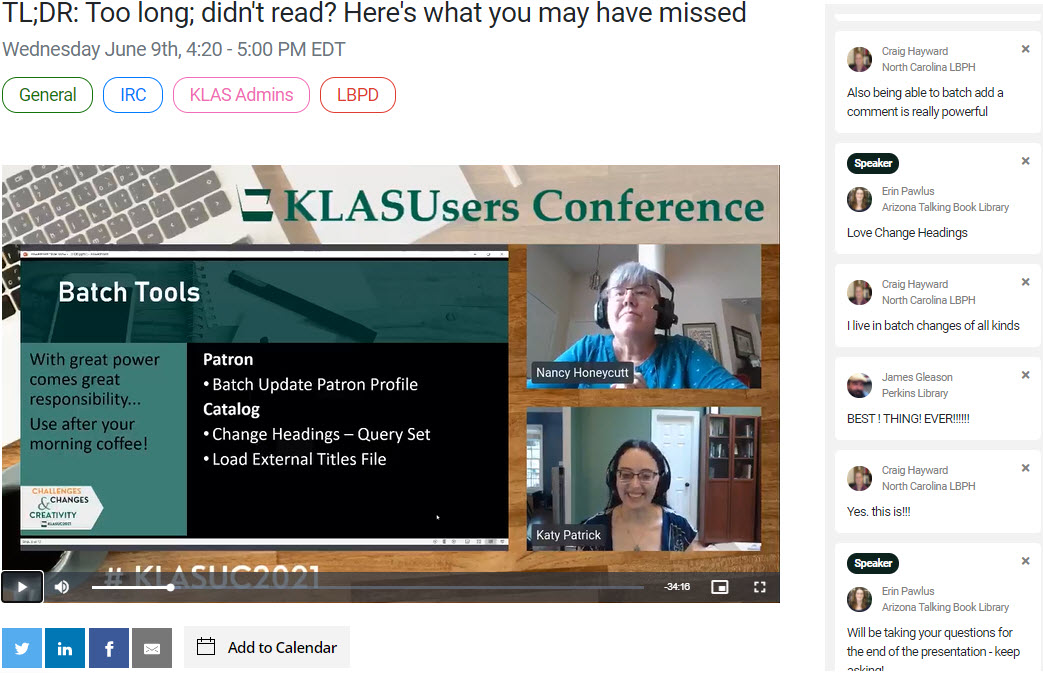
The 2021 KLAS Users’ Conference presentations are now available for download!
In case that feels a little late in coming... no, we didn’t just forget. In fact, the presentations have been available to attendees this whole time, along with the full session recordings, on the PheedLoop conference platform. The reason these presentations are now available here as well is to make them available to those who were not able to join us for the conference.
We want to make sure that those who pay to attend the conference get ample value for it, and plenty of justification for their state agencies. The conference is nota profit-generating event for Keystone, but those registration fees are necessary to cover expenses, whether those expenses are for online event hosting or in-person. With an online conference, there was concern that, if the full recordings were available to everyone, funding agencies may wonder why they should pay for you to attend live sessions at the next conference.
However, we also know that you don’t necessarily choose your funding agency or their restrictions, and many states have very real budget constrictions. We don’t want to leave those of you who can’t attend the conference in the dark!
In committee discussion, this was identified as our solution: the conference presentations (but not the full recordings) would be made freely available after a delay.
We hope this is a help to those of you who weren’t able to join us (without causing trouble for those who were)!
Not sure where to start? We had a fantastic slate of presentations this year, but here are a few of my personal recommendations:
TLDR; Too Long, Didn’t Read
Have trouble keeping up with all the KLAS New Features? Just want to make sure you haven’t missed something important? This session was a look back at some of the best improvements and new features of 7.7, hosted by Nancy and yours truly. In addition to the presentation, instructions and an example user.ini are also available, due to request during the live session.
Nightly Configuration: Understanding How Titles Make It To The Service Queue
Sam Lundburg did a lot of research and testing and knocked it out of the park with his deep dive into Nightly Configuration for Duplication. If you want to know more about how Nightly chooses books for the Service Queue and how you can adjust it to work in your favor, don’t miss this presentation! (Note: please do not hesitate to contact Keystone Customer Support for assistance with your Nightly Configuration.)
X MARCs the Spot: Subject and Series Mapping in KLAS
If you have questions about subject mapping or just wonder what the deal is with the subjects that do (or don’t) show up with new MARC records, read up on it here. Erin Pawlus and Dylan Calhoon share their experiences and lessons about Subject and Series mapping, with plenty of great takeaway information.
P.S. Google Drive Tip
Did you know you can download multiple files from a Google Drive all at once? Due to the number of files available, we felt that this feature would be worth hosting the files on Google rather than on KLASusers itself.
Select all of the files you want (using shift or control), then use the menu icon and choose Download. Google will collect all of the selected files into a zipped folder and start the download automatically.
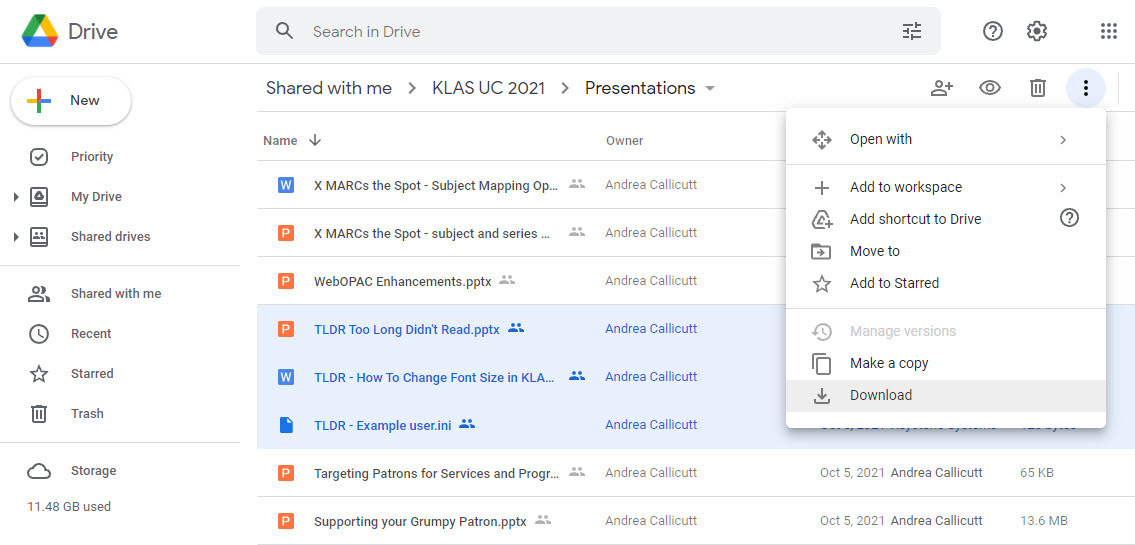
-
2021 KLAS Users' Conference Planning Updates

We're excited to announce that initial planning for the 2021 KLAS Users' Conference is underway. This will be our first biennial conference AND the first hosted by an Instructional Resource Center.
We sincerely thank Dr. Kathy Segers, Director of Accessible Instructional Materials and Outreach Services, Tennessee School for the Blind for being our local host for the 2021 KLAS Users' Conference. We look forward to working with you to plan an informative, inspirational, and rewarding experience for all our attendees.
2021 KLAS Users' Conference Dates & Location
I suspect what y'all really want to know is when and where the conference will be, so here you are...Dates: June 29-July 1, 2021
- Location: Nashville, TN
- Host: Tennessee Instructional Resource Center at the Tennessee School for the Blind
Also, we've identified a few possible hotels in the area and will be contacting them soon for availability and pricing information. We'll let you know ASAP after one has been selected what our conference hotel and room rates will be.
Thank you to everyone who's already helped get us this far, including everyone on our conference planning committees.
Conference Planning Committees
The Planning Committees for the 2021 KLAS Users' Conference have already started meeting, and are looking forward to sharing additional information soon. Below are the current committee members, but we are always looking for additional KLAS Users who might be interested in helping out. You can contact Program Committee Chair Erin Pawlus () or Logistics Committee Chair Chandra Thornton () if you're interested in serving on either.Program Committee Members
- Erin Pawlus, Committee Chair, Arizona Talking Book Library
- Kathy Segers, Local Host, Tennessee Instructional Resource Center
- Cyndi Reimer, California Instructional Resource Center
- Michael Lang, State Library of Kansas, Talking Books Service
- Katy Patrick, Keystone Systems
- Drea Ewing Callicutt, Keystone Systems
Logistics Committee Members- Chandra Thornton, Committee Chair, Palm Beach County Library System - Talking Books
- Kathy Segers, Local Host, Tennessee Instructional Resource Center
- Craig Hayward, North Carolina Library for the Blind & Physically Handicapped
- Andrew Shockley, Oklahoma Library for the Blind & Physically Handicapped
- John Mugford, New Mexico Library for the Blind & Print Disabled
- Sarah Smedley, Palm Beach County Library System -Talking Books
- Kimberlee Hodges, Bayside Area Special Services Library
- Drea Ewing Callicutt, Keystone Systems
Conference Planning Survey
The KLAS Users' Group officers and Program Committee are working on a conference planning survey that will be sent out in early September to help us bring you the best content in the most useful formats. Please be on the lookout for it and be sure to fill it out once you receive it.In the meantime, mark your calendar and start planning for next summer in Nashville. We look forward to having you join us!
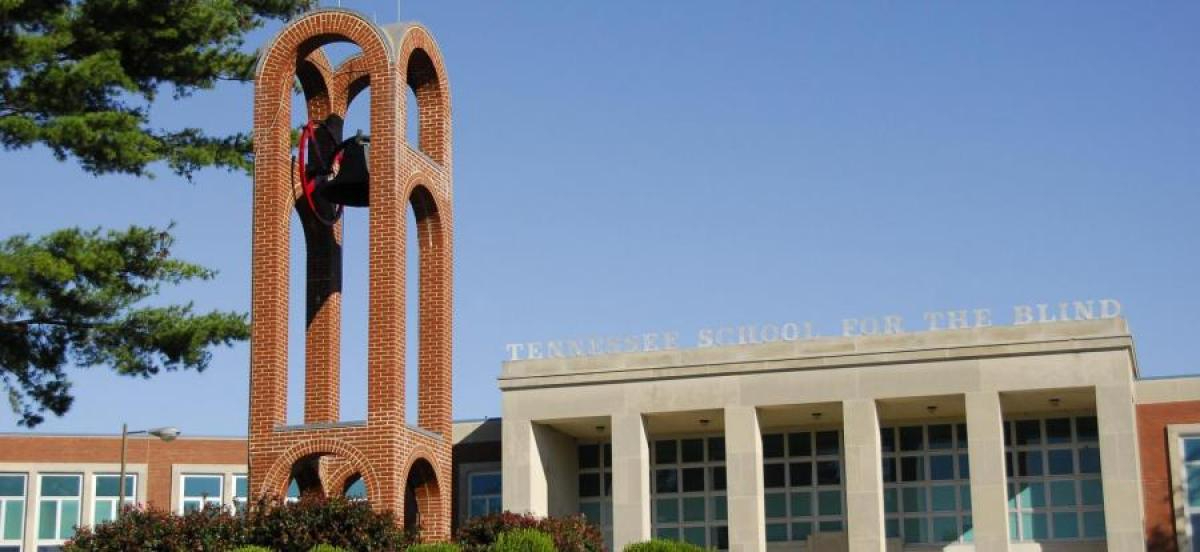
-
2021 KLAS Users' Conference Take 2
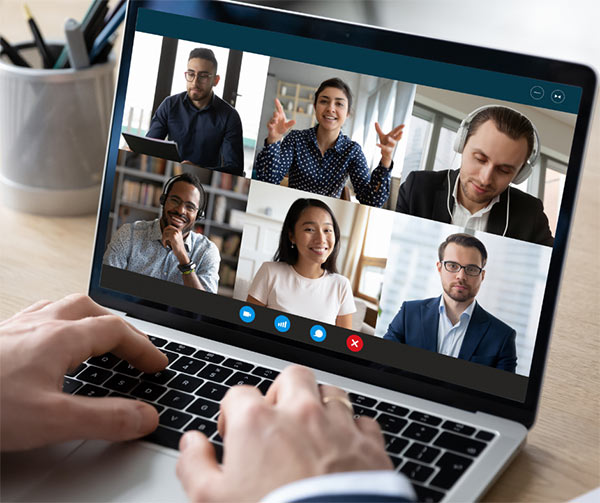
First, we want to thank everyone who responded to our 2021 KLAS Users' Conference Planning Survey. We heard you, and we're moving forward based on your input.
The Program and Logistics Committees, the KLAS Users' Group Officers', and Keystone staff have been working diligently to figure out how to shift the conference to an online event. We're really embracing our conference theme of "Challenges, Changes & Creativity"! In the past few weeks, we've shifted our planning timeline and had discussions about dates, schedule, event management software and services, registration costs, session proposals, and more.
Today, we're excited to share that the 2021 KLAS Users' Conference will be June 7-10, 2021 with the below proposed schedule for each day:
Eastern Time Pacific Time Session Type 11:30-1:30 PM 8:30-10:00 AM General 1:00-1:10 PM 10:00-10:10 AM Break 1:10-2:00 PM 10:10-11:00 AM Breakout 2:00-3:00 PM 11:00 AM-Noon Lunch 3:00-3:50 PM Noon-12:50 PM Breakout 3:50-4:00 PM 12:50-1:00 PM Break 4:00-5:00 PM 1:00-2:00 PM General To give all our attendees the best experience possible, we're planning to use an online event platform. We've evaluated a number of different ones and currently plan to use PheedLoop. Last week, the Planning Committees and Users' Group Officers had an opportunity to see the event participant side of the platform and were impressed with their available features for networking, session scheduling and access, and extensive accessibility options.
Using this platform, conference attendees will be able to attend sessions live or review the recordings later on, message each other privately or in subject groups, and even share files with their fellow users. While it can't fully replicate the feeling of all sitting around the same table, we hope that this format will allow us to bring as much of the full conference experience as possible.
Individual and group registration rates are still being finalized and will be announced soon.
We're hoping more KLAS Users will be able to participate in this year's conference than ever before, since there is no travel required! See you there!
-
2021 KLAS Users’ Conference Registration
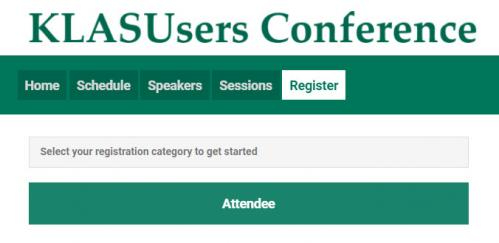
As announced on the e-list yesterday, registration is now OPEN for the 2021 KLAS Users’ Conference! The deadline to register is 8:00 PM Eastern / 5:00 PM Pacific Friday, June 4.
To make this year's process easier than ever, we chose to use the PheedLoop platform to handle registration and even credit card payments. Yes, you can pay via a credit card this year! If you prefer or need to still pay by check, you can also download an invoice directly from the registration page.
- $25 for individual attendee tickets
- $50 for small group tickets (2-5 persons)
- $100 for large group tickets (6-10 persons)
Group Ticket Purchases: If you're purchasing more than an individual attendee ticket, one person from your organization can register, select the combination of the tickets needed, and include each individual attendee's name and contact info. Each listed attendee will be emailed their ticket info separately. An organization can purchase whatever combination of individual, small, and large group tickets makes sense for the number of staff they want to attend.
Example: To purchase one Large Group Ticket for 10 people, select 1 "Large Group Ticket" with your name listed as the "Attendee". Then proceed through the payment and checkout options and then add the other 9 persons as "complimentary ticket" holders when prompted to do so.Follow this link to begin your 2021 KLAS Users' Conference attendee registration or read on for more information about the registration platform.
1. Registration Category
Begin the registration process by selecting “Attendee” – since our conference does not have sponsors or exhibitors, this is the only registration category that will be listed.

2. First Attendee Info
You will then need to fill in details for the first person registering for your library. If you will be purchasing for a group, there is an option to add additional attendees’ information later on as complimentary ticket holders. For now, just enter your own information, or pick someone from the group that will be attending, then proceed to checkout.
There is an optional field if you would like to give us a heads-up about any accessibility requirements. One reason we chose the PheedLoop platform to host the conference was its extensive suite of accessibility options, but don’t hesitate to let us know what you may need. We want everyone to have full access to the conference!
On the second page, please select what pronouns your fellow attendees should use for you during the conference. You can select multiple options if desired (for example, if you are comfortable being called either “she” or “they” and want people to use both options for you).
3. Ticket Selection
Next up is the ticket page, where you can select the ticket or tickets you are purchasing for your organization. For example, if you want to register a total of 5 people for the conference, add 1 “Small Group” ticket (which will cover your registration, plus up to 4 additional individuals, listed as complimentary ticket holders). For 15 people, select 1 Small Group ticket and 1 Large Group ticket then proceed to checkout. And of course, if it’s just one person, scroll down to “Individual.”
Once you have added at least one ticket, fields will be added to designate the Ticket Owner--just leave the info that is brought in with your own details. There will be a place later in the process to add the info for the additional people you will be registering under a group ticket.
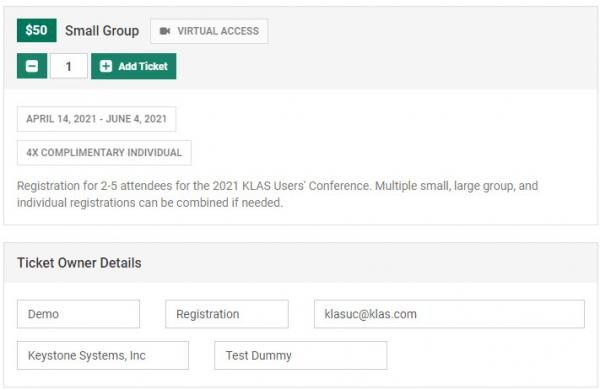
4. Payment
You can pay by credit card, or select “Other Payment Method” to generate an invoice and pay by check. You can download once your registration is submitted, and it will be emailed to you as an attachment as well. The invoice will include information on where payment should be sent, and what information to include with it.
When you have selected all desired tickets and your payment type, use the Checkout button to proceed.

5. Success Page
Congrats, you are not officially registered! If you selected "Other Payment Method," your registration will be pending until payment has been received.
If you've included any group tickets in your registration, the success page will allow you to register the additional attendees included in the ticket price. It does not collect as much info for them as it does for the original ticket holder, but they can fill in additional info in their profile later on.
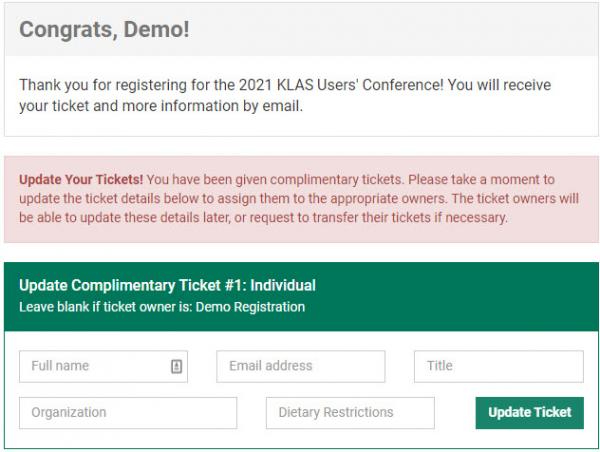
Note that the fields include "Dietary Restrictions" by default, but since this is a virtual conference, we don't need to know that! Feel free to use that field to report any Accessibility Requirements instead.
Be sure to use the Update Ticket button for each ticket once you've assigned it to the proper individual. You do not need to assign any of the complimentary tickets to the person whose info you already filled in--that person is already registered.
Finally, the success page also includes the option to download your invoice (if you selected Other Payment Method) or your receipt (if you paid by credit card).
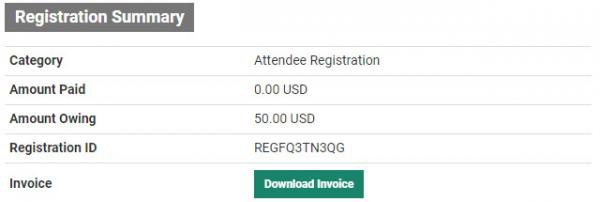
Questions?
If you have any problems with or questions about the registration process, please let us know at ! The occasional wrinkle is inevitable, with this being our first-ever online conference, but we will do everything we can to make it a smooth and easy experience for our attendees.
Thanks for your patience as we get this all worked out!
-
2021 Online KLAS Users' Conference
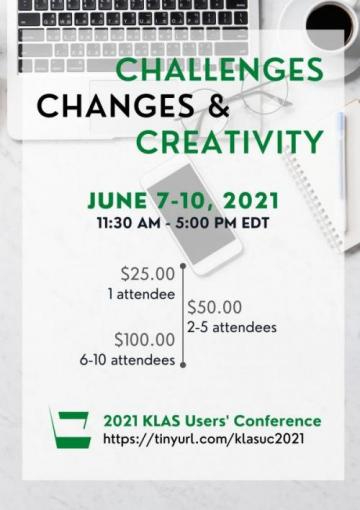
Below you will find the latest udpated about the 2021 ONLINE KLAS Users' Conference. Please let us know if you have any questions or need additional information.
2021 KLAS Users' Conference Website & Attendee Portal:
Theme: Challenges, Changes & Creativity
Overview Schedule:
- KLAS UC 2021 Overview Schedule with Sessions - PDF
- Overview schedule in spreadsheet format on Keystone's Google Drive.
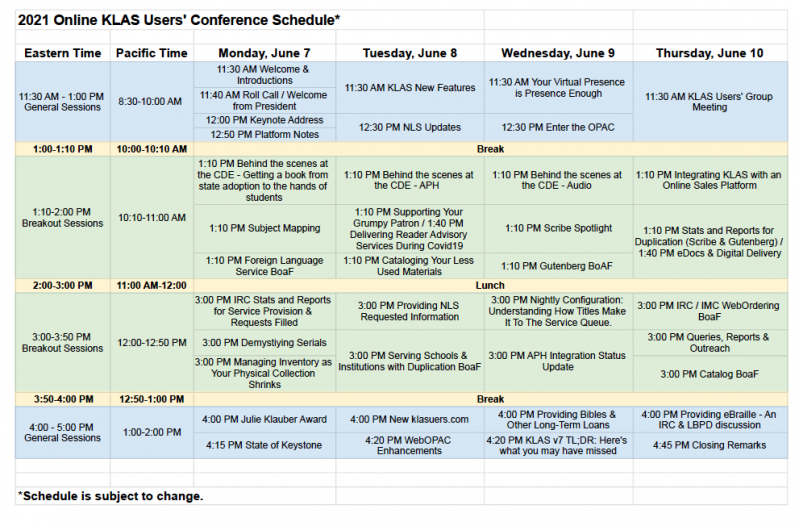
Format:
To give our attendees the best experience possible, we will be using the PheedLoop online event platform. The Planning Committees and Users' Group Officers had an opportunity to see the event participant side of the platform and were impressed with the features for networking, session scheduling and access, and extensive accessibility options.
Using this platform, conference attendees will be able to attend sessions live or review the recordings later on, message each other privately or in subject groups, and even share files with their fellow users. While it can't fully replicate the feeling of all sitting around the same table, we hope that this format will allow us to bring as much of the full conference experience as possible.
Registration:
Go here to begin your 2021 KLAS Users' Conference attendee registration.
The deadline to register is 8:00 PM Eastern / 5:00 PM Pacific Friday, June 4. If you have any questions about the group registration process, check out this step-by-step for a detailed explanation with screenshots.
Conference Registration is now open!To make this year's process easier than ever, we chose to use the PheedLoop platform to handle registration and even credit card payments. Yes, you can pay via a credit card this year! If you prefer or need to still pay by check, you can also download an invoice directly from the registration page.
- $25 for individual attendee tickets
- $50 for small group tickets (2-5 persons)
- $100 for large group tickets (6-10 persons)
Group Ticket Purchases: Example: To purchase one Large Group Ticket for 10 people, select 1 "Large Group Ticket" with your name listed as the "Attendee". Then proceed through the payment and checkout options and then add the other 9 persons as "complimentary ticket" holders when prompted to do so. Each listed attendee will be emailed their ticket info separately. An organization can purchase whatever combination of individual, small, and large group tickets makes sense for the number of staff they want to attend. For example, a library can purchase one small group and one large group ticket for a total of $150 to cover up to 15 attendees.
Registration fees go towards the conference platform and video streaming services. This is not intended to be a profit-generating event! That said, the math on this kind of thing is difficult. The per-attendee cost of the event will vary significantly based on how many attendees we have, and while we have a lot of experience budgeting for and operating an in-person conference, an online conference is new to us. If we find that we undershot on the registration fees, Keystone will cover the additional costs. If we end up generating a little extra, it will be used towards the next conference.
-
2021 Year in Review
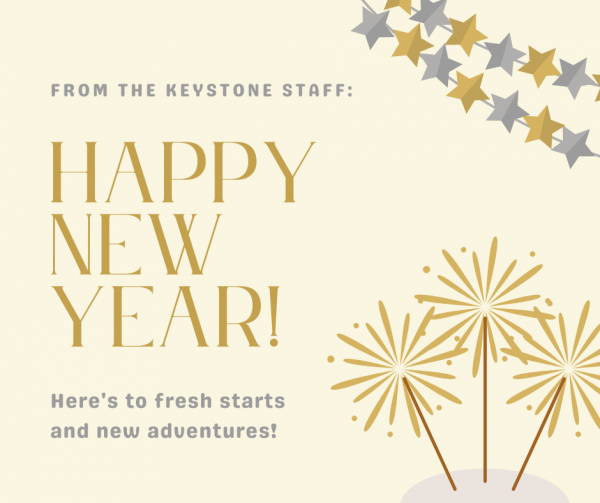
It’s been another turbulent, often-difficult year, but once again, we’ve made it through. In fact, this year has seen a number of highlights for us! Here are a few of my high points:
We’ve revamped KLASusers.com to modernize it, make it more easily searchable, and present content by topic instead of by format. We’ve recently made another big stride towards this goal by adding the tag listing to the Knowledge Base and News areas, allowing you to easily browse some of our top topics.
We hosted our first-ever all-online KLAS Users’ Conference, allowing us to not only hold this years’ conference safely, but to include more of our users than ever before. We learned so much from this experience, and I’m sure we’ll benefit from that experience even if and when we move back to a primarily in-person event.
We continued to improve Duplication on Demand to make it as reliable, customizable, and powerful as you’d expect from KLAS. This included adding the Duplication Orders by Status report, new options for managing patron’s Service Queues, check-in alerts, and even (in our latest update) customizable sound support for Scribe systems, along with countless smaller tweaks, bug fixes, and “quality of life” improvements.
For our IRC customers, we have a strong start on integration with APH’s ordering system, which will allow you to submit Purchase Orders directly from KLAS, with Catalog integration coming soon as well. If you missed our update on this project earlier this month, make sure to check out the recording!
I could go on and on, but I’ll leave it here for now. After all, it’s about time to be closing the door on 2021, and looking ahead to the possibilities and promise of next year. Until then: best wishes for a happy and healthy 2022!
-
2023 In Review
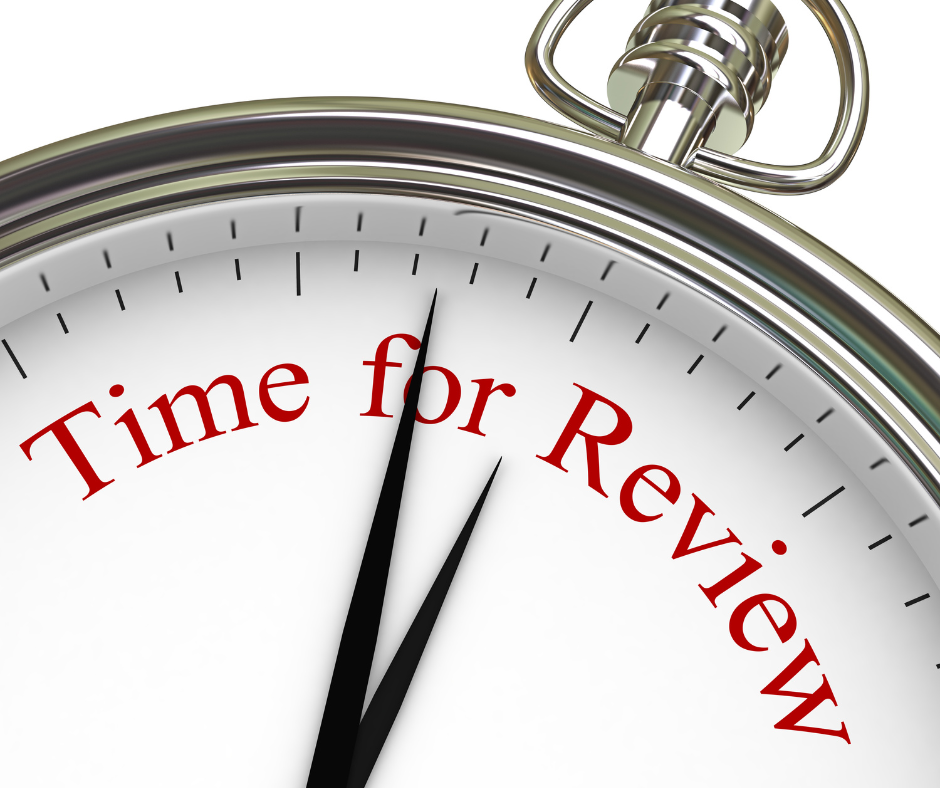
Now that we're into 2024 (with January flying by rapidly!), let's take a look back at the past year together.
The 2023 Users' Conference was a return to in-person training, networking, and collaboration, but for the first time we also had a hybrid option! This format was tricky to run. Yet with the hard work of the Users' Group Programming and Logistics Committees we feel we achieve a good balance of in-person exclusives like providing in-person-only, hands-on training sessions each morning, online value such as ensuring front-line and specialist staff had options to attend only sessions relevant to them, and offering the ability for libraries unable to travel for conferences to still benefit from the conference, while also remaining accessible.
You can find the presentations and handouts from the conference here: KLAS UC2023 Presentations & Handouts
Keystone staff also attended a number of other conferences, including the NLS Sub-Regionals and the APH Annual Conferences. These events provide another opportunity for us to connect with our users, and to learn about the challenges and opportunities your libraries and organizations face.
Outside of these events, we strove to continue providing training throughout the year. This included the release of two new Manuals in our new format (Reader Adviser Manual and Transfers Manual). Each are designed to be friendly to use in a print or digital format including with a screen-reader, and I have more in the works! We also hosted webinars including Preparing for e-Braille and a KLAS Q&A with Katy, and continued providing online Administrator's Training sessions.
Additionally, the klasusers.com forums were busy this year. Thank you to everyone who helped get the word out about catalog errors and reissued titles on the Cataloging forum, posted ideas and requests in the Development Suggestions forum, and weighed in on others' requests and questions.
In terms of development, we've been making progress on several large projects and released a whole lot of smaller improvements, new features, and bug fixes. Ongoing larger development projects include:
- the APH Ordering Integration which is now functioning live for Free Matter orders at our test site (with support for orders that require Shipping pending development on the APH end of the integration)
- the new WebOPAC, which was previewed at the conference and will include better support for series, serials, and duplication
We know these are highly anticipated and continue to work towards getting them out to you.
We have also been working extensively with Data Management and NLS to get PIMMS issues identified and fixed, implement Inactive Reason tracking, and lay the groundwork for the network libraries to take over distribution of NLS serials from the Magazine on Cartridge (MoC) program.
Shout-out to the KLAS Development Advisory Committee (KDAC) for their invaluable help not just generating ideas and suggestions, but helping us monitor and evaluate development suggestions from the forum and other sources, ensure corner cases are considered and accounted for, and prioritize all these projects and more.
As we carry on into the new year, I know we will have even more good things to share with you and look forward to the journey!
-
3/14/2024 e-Braille Circulation Webinar
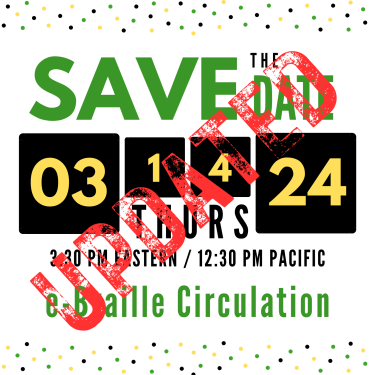
During this session, Katy Patrick discussed features and functionality in KLAS, including machine management and duplication workflows, as well as tips & tricks to help KLAS libraries prepare for and / or better manage their e-Braille Circulation.
The recording from 3/14/2024 is now available:
-
A look at the KLAS roadmap
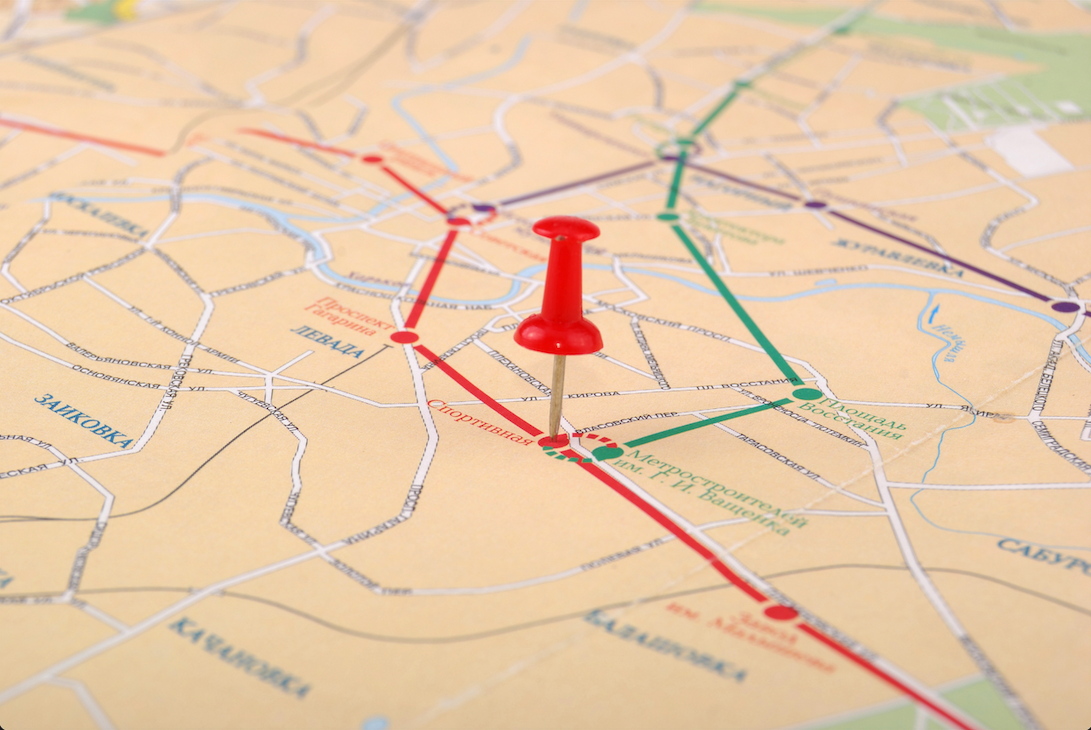
KLAS v7.8 is coming!

After two years of small updates, we’re really close to bidding farewell to KLAS v7.7 and rolling over to v7.8. This will not be a big change at all from your perspective, but I want to give you a heads-up about what’s coming and why.
The first KLAS v7.8 release will likely include other fixes and improvements, but the update triggering the version change should be completely invisible. That update is to Open Edge (OE), the framework and programming language we use to build the KLAS interface. The new version of OE will provide us access to new options for programming KLAS, keep us up to date and allow us to get any bug fixes on that end of things. However, nothing should change to the look and feel of KLAS. How it runs, what is available for users, and how we support it will all remain the same.
To make sure the update to the back-end doesn’t introduce any problems on the front-end, we’ll be doing a lot of rigorous testing. We’ll also rely on feedback from our Early Release customers even more than usual so we can be sure we haven’t missed anything. Fortunately, we do not anticipate any changes or problems. This won’t be a major conversion (like the one from 7.6 to 7.7), just a big update.
So, in short, v7.8 will be an update for us, but not any different for you. Don’t worry, we’ll keep those bi-weekly small updates coming with all the bug fixes, improvements, and new features we can squeeze into them.
So... whatever happened to v.8?
If you attended the 2018 KLAS Users’ Conference in Idaho, you probably remember testing our prototype user interface for the web-based KLAS v.8. It’s something that we and you were really excited about, so it makes sense that we get questions about it on occasion.
For quite a while, we didn’t have much to say. That’s because, right after the 2018 conference, we realized just how big the need was to get Duplication on Demand up and running at full scale ASAP. We shifted gears pretty hard, switching our attention to: taking Scribe from a proof-of-concept to a fully-realized appliance capable of supporting a library’s full circulation; getting Gutenberg integration in place; and building screens, workflows, and features to support this whole new approach to service.
Additionally, we needed to keep up with the development needs of our IRC/IMC customers, bring new customers online, and keep everything else running. That “keep everything else running” was complicated by the deployment of 7.7 and all the development needed to support it, and a massive server crash that prompted our migration to all cloud hosting.
Unfortunately, the pivot to duplication ate up the time and resources we’d hoped to devote to KLAS v.8. But there’s is good news! With Duplication on Demand finally getting to be as robust and fully-featured as we envisioned, and the needs of our IRC / IMCs lining up with some things we needed to do anyways... we’re finally able to provide an update: we are at work on the foundations of v.8!
To be clear, it’s still a very long road ahead. Building an entirely new UI (informed by the prototypes and user testing from 2018, and everything new we’ve added to KLAS since) is a huge undertaking requiring a lot of development resources. However, the other major task will be the need for the UI to communicate with the database storing all of your information by way of APIs. Finally, the APIs needed to be built and implemented so that they allow existing programs in KLAS to function alongside any user interface we build moving forward—we know from painful experience that we can’t rebuild all of KLAS at once and release an entirely new interface with everything you need ready and working on day 1.
We’re excited to say this key building block, the suite of APIs that will provide the machine-to-machine communications needed for v.8 to function, is now underway!
You may have noticed these APIs cropping up in Release Lists this year, and more are coming. For now, IRCs that maintain student data, orders, and catalog info in more than one system are using and will be using these APIs to integrate with third party systems, but the beauty of APIs is that once they are in place, any compatible system can use them. The programming we’re doing now to integrate with other systems will be the thing that allows us to integrate with the browser-based KLAS v.8 in the future (while still allowing the v.7 interface to be used during the transition).
How long will this take? It’s really hard to say. It ultimately depends on what other development is needed, what new needs crop up which we haven’t anticipated, and what resources open up for us to take this on. But getting the APIs in place is incredibly important foundational work, and we’re really excited to finally get them on the front burner and in progress.
-
A look back: 2022 in Review

Another year is in the books, and we’re stoked to be officially in a conference year! But, before we barrel ahead, let’s take a look back at 2022.
Around the Office
The Keystone offices were a little less quiet this year as some of the staff have transitioned back to working from the office on a regular basis. However, there have been even bigger transitions as we've seen some staffing changes.
Longtime developer Brian White and customer support specialist John Owen retired, but new faces George and Katharina have joined the family in their stead.
Events & Training
This past summer, we held our 2022 KLAS Mini-Conference to help fill the gap between conference years. Thank you to everyone who joined us and helped make it a successful event! We hope to see you all again either in-person or online for the 2023 Users Conference!
We also held the first online IRC Administrator's Training! Thanks as well to our first round of IRC Admins, and we hope everything you learned has been serving you well.
Last but not least, we want to highlight the Onboarding New KLAS Users webinar. If you've had staffing changes of your own, or expect to bring on some new staff in the new year, make sure to check it out!
KLAS Development
Finally, 2022 has been a big year for KLAS development, even if it has sometimes seemed quiet from the user's side, as we made big strides in some big projects. Here's some of the highlights:
- Scribes can now unlock NLS Cartridges making it easier to repurpose physical collections and quicker to start using new white cartridges.
- To meet PNDB funding requirements, a major integration project with Rolka-Loube was implemented and is in Live use now as agencies complete their year-end reporting.
- The New WebOPAC, while not yet ready for release, is coming along beautifully. Thank you everyone for your feedback and feature requests!
- APH Integration for our IRC customers is another ongoing project which, while not yet in Live release, should be ready to go very soon.
And of course, there was much, much more--all of which can be found in the 7.7 Release Lists.
-
A look back: KLASUsers 2020 Highlights
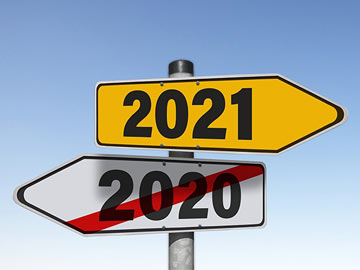
There were days that cast it into doubt, but some good things did happen in 2020! Let's have a look at some of them from this very website (with lots of links to get caught up if you missed something in the tumult).
We had a very successful series of webinars, covering both LBPH and IRC topics of interest, and including Keystone-led, User-led, and roundtable formats. Additionally, we had the chance to meet with y'all at the APH online conference and at the NLS online conference. We also transitioned KLAS Administrator's Training to an online format with a renewed and refreshed curriculum to better meet the needs of our Admins.
Back in January, we introduced the Scribe Mini! This little guy can store the entire digital collection, can either run a full Scribe Tower, or be used as a stand-alone device at a front desk or outreach location. On the other side of the hardware aisle, Teresa Kalber of the Colorado Talking Book Library, one of the first KLAS libraries to implement Gutenberg, shared their experience in the Hot off the Press blog series.
Then Covid took over the news and turned our expectations for the year on end. Even when things were hard though, KLAS Users put in their time and effort to help each other, including by sharing their experiences, lessons, and strategies as we all adjusted to lock-downs and quarantines.
Despite the difficulties of the year, business continued as best it could, including the need to track and report on statistics. In Get to Know the Circulation Report, I shared some info to help you make friends with one of our most powerful reports.
Finally, we continued to refine and improve our Disaster Preparedness and Recovery processes, ensuring that we can respond to anything and keep you all up and running as best as possible.
Despite the uncertainty ahead our excellent user committees continued to plan the 2021 KLAS Users' Conference, balancing the need for flexibility with the planning timeline. Watch for the latest information and the results of the recent planning survey coming very soon!
Over on our other website, we re-launched KLAS.com with an all-new (and much improved) look and feel! We were so happy with the results, in fact, we're actively working to provide KLASUsers.com with a similar refresh.
Here's to 2021! This year is shaping up to be plenty weird and challenging in its own way, but we do we expect it to bring an easier-to-use and more modern KLASUsers.com, and plenty of new content to keep you all informed and empowered as users!
Page 1 of 10

